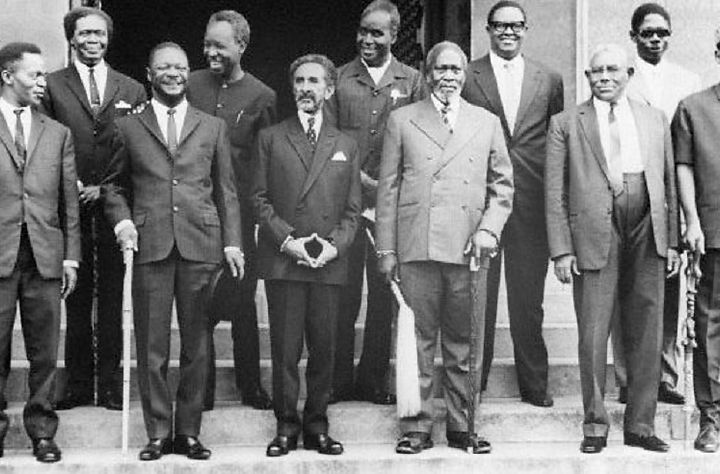
The First Pan-African Conference was held in London from 23 to 25 July 1900 (just prior to the Paris Exhibition of 1900 "in order to allow tourists of African descent to attend both events"). [Image Credit:
Black History Month UK / www.blackhistorymonth.org.uk]
Explore how Pan-Africanism is evolving in the 21st century through economic integration, youth activism, cultural revival, and diaspora engagement.
Published:
June 11, 2025 at 7:37:36 AM
Modified:
June 11, 2025 at 7:43:37 AM
Pan-Africanism, a centuries-old political and cultural ideology rooted in the unity and liberation of African people, has transformed dramatically in the 21st century.
Once symbolized by anti-colonial resistance and the formation of post-independence governments, Pan-Africanism today is reshaping itself through digital connectivity, economic integration, youth activism, and continental diplomacy. This evolution signifies not just a revival but a reinvention of Pan-African ideals to meet the demands of modern African realities.
The origins of Pan-Africanism lie in the resistance against slavery, colonialism, and racial oppression. Pioneers like W.E.B. Du Bois, Marcus Garvey, Kwame Nkrumah, and Julius Nyerere laid the ideological foundation for African unity and solidarity among people of African descent across the globe. The formation of the Organization of African Unity (OAU) in 1963 and later the African Union (AU) in 2002 marked institutional milestones in the Pan-African journey.
However, post-independence Africa faced challenges, including internal conflicts, neocolonialism, and authoritarian regimes that often muted Pan-African aspirations. The 21st century, however, has ignited a resurgence with renewed purpose.
One of the most significant expressions of modern Pan-Africanism is economic integration, led by the African Continental Free Trade Area (AfCFTA). Launched in 2021, AfCFTA represents a Pan-African vision of creating a single market for goods and services across 54 countries.
Over 1.3 billion consumers across Africa are now theoretically part of the same trade bloc.
Digital trade protocols, infrastructure harmonization, and industrialization strategies are being prioritized to unify African economies.
This economic Pan-Africanism is not just about removing tariffs, it is about creating inclusive prosperity and reducing Africa's dependence on external markets.
Africa’s youth, which contributes to over 60% of the population, is at the forefront of a new wave of Pan-Africanism, fueled by technology, creativity, and social consciousness. Movements like #EndSARS in Nigeria, FeesMustFall in South Africa, and pro-democracy protests in Sudan and Senegal have transcended borders, uniting young Africans through common struggles.
Pan-African identity is being reshaped through music (Afrobeats, Amapiano), film (Nollywood, Wakanda-inspired narratives), and digital storytelling.
Platforms like Twitter, TikTok, and YouTube are now stages for continental dialogues on politics, culture, and development.
This digital Pan-Africanism amplifies shared experiences and aspirations, connecting Kinshasa to Kigali, Accra to Addis Ababa.
The African Union has undergone reforms to enhance its effectiveness in peacekeeping, electoral integrity, and policy enforcement. Though still facing limitations, the AU has:
Introduced the African Peer Review Mechanism (APRM) to monitor governance.
Strengthened its Peace and Security Council, with increased mediation efforts in conflict zones like the Sahel, Sudan, and eastern DRC.
Advocated for Africa’s permanent representation on the UN Security Council, under the Ezulwini Consensus.
Leaders like Ghana’s Nana Akufo-Addo have championed self-reliance, intra-African cooperation, and decolonization of global finance echoing Pan-Africanist visions of political sovereignty.
Pan-Africanism in the 21st century is global. The African Union now formally recognizes the African Diaspora as the “sixth region” of the continent. Initiatives like Ghana’s “Year of Return” (2019) and “Beyond the Return” campaigns have reconnected African-Americans and Caribbeans with ancestral lands.
Investment summits and citizenship pathways for diaspora communities are being expanded across West and East Africa.
Influential figures like artists, scholars, and tech entrepreneurs are shaping transatlantic alliances, bringing new capital, ideas, and advocacy to the African project.
This strategic engagement bridges historical wounds with future-oriented collaboration.
However, despite promising shifts, Pan-Africanism still faces formidable obstacles:
Colonial-era borders, visa restrictions, and language barriers hamper mobility and integration.
Military coups, corruption, and elite capture undermine democratic consolidation and trust in institutions.
External influences like China, the U.S., the EU, and Russia continue to compete for Africa’s allegiance, testing the continent’s strategic autonomy.
These challenges underscore the need for a Pan-Africanism that is not just symbolic but institutional, accountable, and people-driven.
The 21st-century evolution of Pan-Africanism is not about replicating the past, it is about redefining unity for a multipolar, digital, and interconnected age. From grassroots activism to continental trade, from cultural revival to diasporic solidarity, Africa is crafting a modern Pan-Africanism that is pragmatic, inclusive, and forward-looking.
As the world grapples with climate crises, economic shocks, and identity politics, Africa’s Pan-African experiment may yet provide a model of unity in diversity, resilience in adversity, and strength through solidarity.
Keep Reading



